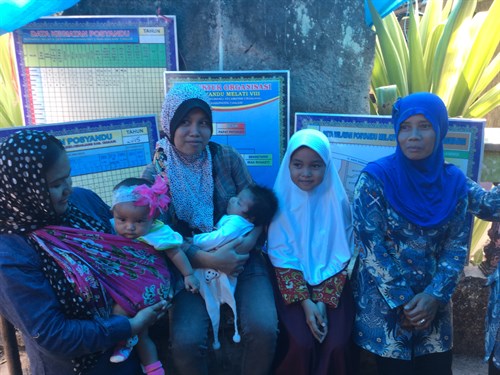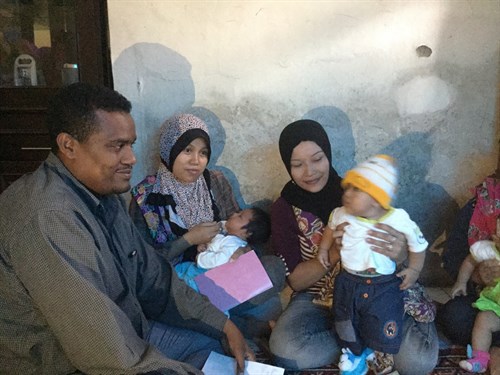
By Allone Ganizani (Ministry of Health, Malawi), Shashamo Bulasho (Head of Shebidino District, Sidama, Ethiopia), Sudirman Nasir (REACHOUT Indonesia) and Sally Theobald (Liverpool School of Tropical Medicine, UK)
We were welcomed into the home of Papat Patonah (leader of the voluntary community health workers) and her husband Ratim, head of the neighbourhood in Karangwangi village, Cianjur. This was the occasion of the Posyandu, a once monthly community based check-up for pregnant women and mums with new babies. Papat’s house was full of beautiful babies, proud mums and pregnant women. One father was also present in the Posyandu and encouraging male involvement is critical and is an important aspect to drive forward. Participants were taken through a health promotion session on health care seeking in pregnancy, danger signs and nutrition during and after pregnancy.
The session was conducted with the help of an interactive pictorial guide designed following baseline research by the REACHOUT Indonesia team. Village volunteers were trained by REACHOUT Indonesia through participatory workshops in adult learning approaches to use the pictorial card to discuss maternal health issues with pregnant mothers.
The Posyandu approach has been in existence since the 1980s and is a key strategy in bringing lifesaving maternal and new-born health services closer to communities across Indonesia’s 17,000 islands. There is much diversity across these islands and some Posyandu’s are more active than others. We visited an active one, Ratim, head of the neighbourhood, is an ex-soldier and had previously served in Papua where he had learnt about women giving birth alone, and facing challenges and death in some cases. He was motivated to help as is his wife Papat leader of the kaders (voluntary Community Health Workers) and together with inputs from a community midwife they welcome women into their house for a range of services including: health promotion, blood pressure, vitamin A, iron tablets, checking foetal movement and baby checks – including weighing. Posyandus are either held in the home of a kader, in a school or a community building. Their construction is a joint venture between the government and communities: sometimes the communities donate the land and the government supports the provision of materials for construction. The Posyandus are held in the first three weeks of each month and the final week of the month is dedicated to processing and sharing data on uptake of services with the local health centre (Puskesmas).
We asked about the presence of traditional birth attendants (TBAs) and were told they are also present; and a collaborative relationship has been forged between the kaders and the TBAs to support and promote women’s health. Many women prefer TBAs because of the cultural familiarity, the use of massage and special bathing ceremonies for the new born. In the new collaborative relationship, TBAs support pregnant women to avail of the services at the Posyandu and facility birth but can still provide post-partum massage and support in line with cultural preferences and norms.
Like in many contexts, poverty and gender play out in rural Indonesia to limit poor women’s access to health care. Previously there was a special scheme to support pregnant women to access care, this has now been integrated into a broader national insurance scheme. Kaders and the neighbourhood association play in key role in supporting poorer women to access health services through liaison with the village head who can issue a letter that can be used to be included in the insurance scheme. Village members also donate to an Islamic charity fund which can be used to pay for transport to the health centre when required as the community insurance dos not cover indirect costs
We were inspired by the community ownership and drive to promote women’s health we witnessed in Karangwangi village. Close-to-community providers are a vital interface between communities and health systems, and can play a critical role in realising universal health coverage and improving community health and well-being.

Shashamo Bulasho from Shebdino, Ethiopia visiting women using the Posyandu services in Cianjur, Indonesia
Recent news
- REACHOUT at the Canadian Conference on Global Health, 3 November 2015
- Alignment, engagement and collaboration: approaches to ensuring Quality Improvement is embedded, 2 November 2015
- Participation, perspectives and possibilities: Mobiles, Development and Global Health, 29 October 2015

This project is funded by the European Union.
